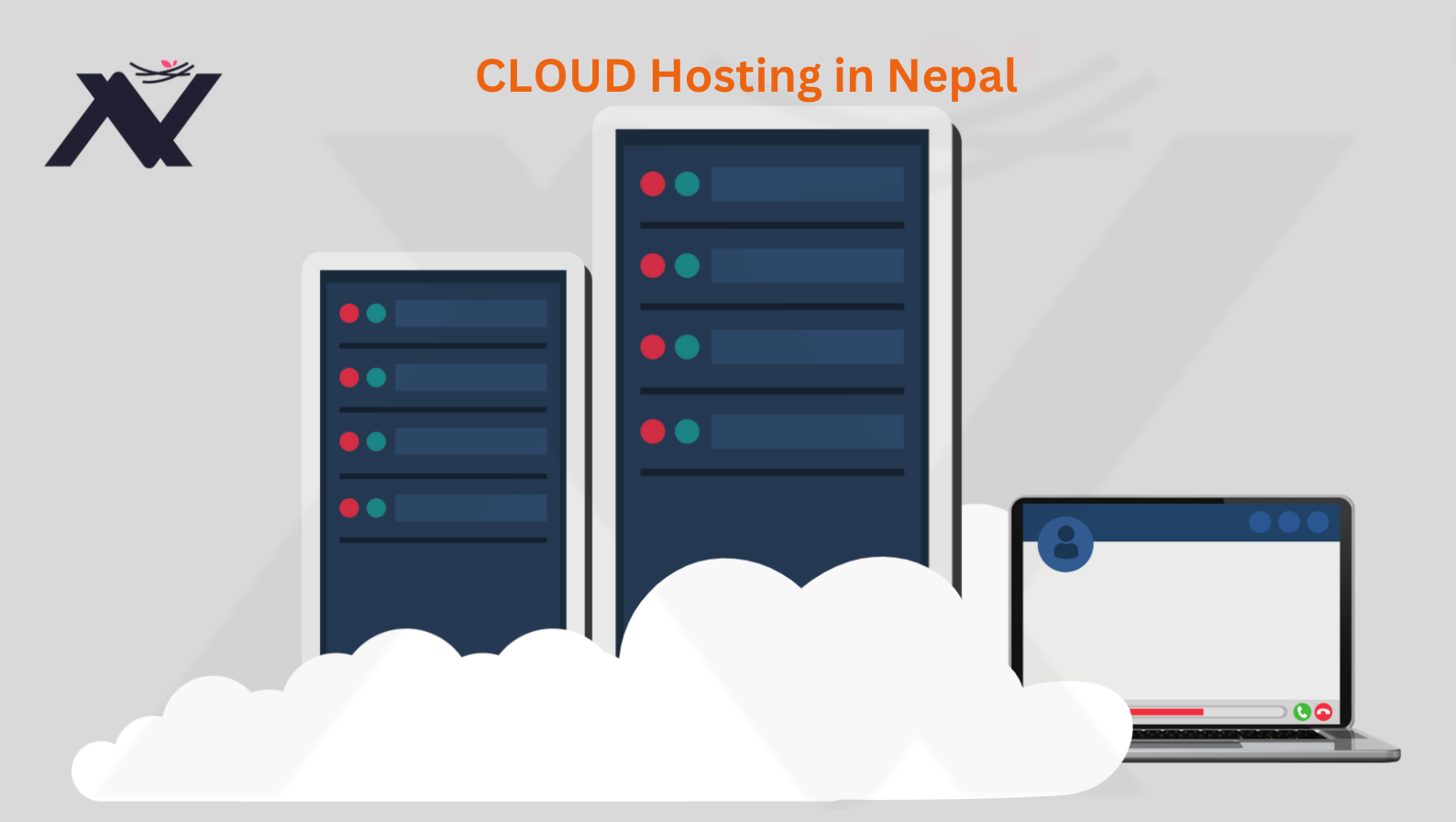Cloud hosting is a type of web hosting service that stores and manages websites and applications on virtual servers. It provides scalable resources and high reliability, as the resources are distributed across multiple servers. Cloud hosting is a cost-effective and flexible solution that allows businesses to adjust their resources as needed.
While cloud hosting offers many benefits, it may not be suitable for every business or application. Security, compliance requirements, and specific needs should be considered. Conducting thorough research and evaluation of different providers is crucial to determining the best fit for specific requirements.
The Benefits of Cloud Hosting for Businesses in Nepal

Nepal, like many other countries around the world, is witnessing a rapid increase in the adoption of cloud computing technology. This is due to the numerous benefits that cloud hosting provides for businesses in Nepal. Some of the benefits of cloud hosting with Nest Nepal include increased scalability, flexibility, and accessibility. Moreover, cloud hosting allows businesses in Nepal to reduce their capital expenses by eliminating the need for costly on-premise IT infrastructure. Furthermore, cloud hosting also provides enhanced security features and disaster recovery options to protect critical business data from potential cyber threats or natural disasters.
As a result, businesses in Nepal can improve their overall operational efficiency and productivity while also reducing downtime and minimizing IT-related expenses. In summary, cloud hosting is a game-changer for businesses in Nepal that are looking to stay competitive and agile in today’s digital landscape.It highlights some of the key advantages that cloud hosting offers for businesses in Nepal, such as increased scalability, flexibility, accessibility, reduced IT infrastructure costs, enhanced security features, and disaster recovery options. By embracing cloud hosting, businesses in Nepal can gain a competitive edge and drive growth by leveraging cutting-edge technology solutions that enable them to be more responsive.
Cloud hosting vs. Web hosting

Web hosting refers to the traditional hosting services that have been available for many years. In this type of hosting, a website is hosted on a single server, which is located in a data center. The server is typically shared with other websites, and resources such as CPU, RAM, and disk space are allocated based on the hosting plan selected by the customer. Web hosting services are typically more affordable than cloud hosting, and are well-suited for smaller websites that don’t require a lot of resources.
Cloud hosting, on the other hand, refers to a more modern hosting solution that is based on cloud computing technology. In this type of hosting, a website is hosted on a virtual server that is created by combining multiple physical servers in a cloud infrastructure. Cloud hosting offers many advantages over web hosting, including high scalability, reliability, and flexibility.
Cloud hosting services are typically more expensive than web hosting, but they can handle large amounts of traffic and are ideal for large businesses or websites that require a lot of resources. In summary, web hosting is a traditional hosting solution that is best suited for smaller websites with lower traffic, while cloud hosting is a more modern hosting solution that offers high scalability and flexibility for larger websites with high traffic.
Cloud hosting vs VPS

Cloud hosting and Virtual Private Server (VPS) are two different hosting solutions, each with their own benefits and drawbacks.
Cloud hosting is ideal for websites that require high availability, scalability, and reliability, while VPS hosting is ideal for websites that require more control and flexibility at a lower cost. Ultimately, the choice between cloud hosting and VPS hosting depends on the specific needs of the website and the resources available to the website owner.
VPS, on the other hand, is a virtualized server that runs its own operating system and has dedicated resources allocated to it. The server is hosted on a physical server that is divided into multiple virtual servers, each with its own resources such as CPU, RAM, and storage.
VPS offers more control and flexibility compared to shared hosting, and is an excellent choice for websites that require more resources and customization options. VPS hosting is typically more affordable than cloud hosting, but may not be as scalable or reliable.
How does Cloud hosting work?

Cloud hosting is a type of web hosting that utilizes a network of servers to provide resources to websites on-demand. In other words, instead of relying on a single physical server, cloud hosting relies on a cluster of servers working together to provide a reliable and scalable hosting environment. This is achieved through the use of virtualization technology that enables the creation of virtual machines on top of physical servers. These virtual machines are isolated from each other and have their own set of resources including CPU, RAM, and storage.
When a website requires more resources, it can scale up its virtual machine by allocating more resources from the available pool. This means that cloud hosting can easily accommodate websites with fluctuating traffic volumes, as they can quickly and automatically adjust resource allocation to meet changing demands.
Additionally, cloud hosting often offers redundancy and backup options to ensure that website data is secure and accessible in case of any hardware failures or other issues. Overall, cloud hosting is a flexible and scalable hosting solution that offers numerous benefits to website owners who require high availability and performance.
Why use Cloud hosting?

Cloud hosting has become a popular choice for website owners due to its numerous advantages. One of the most significant advantages of cloud hosting is its scalability. With cloud hosting, websites can quickly and easily scale resources up or down as needed, making it ideal for websites with fluctuating traffic volumes or sudden traffic spikes. This means that website owners can ensure that their websites remain responsive and accessible to users, without worrying about downtime or performance issues.
Another reason to use cloud hosting is its reliability. Cloud hosting uses a network of servers instead of a single physical server, which makes it less vulnerable to hardware failures or other issues that can cause downtime. Additionally, many cloud hosting providers offer redundant storage, backups, and disaster recovery options to ensure that website data is always available and secure.
Public vs. Private Cloud Hosting: Which is Right for Your Business?

Cloud hosting has become increasingly popular over the years, offering businesses an affordable and scalable hosting solution. However, with so many options available, it can be challenging to decide which cloud hosting solution is right for your business. In this article, we’ll explore the differences between public and private cloud hosting and help you determine which is the best fit for your business.
Public Cloud Hosting
Public cloud hosting is a shared hosting environment, where multiple users share the same resources on a remote server. The infrastructure is owned and operated by a third-party provider, who is responsible for maintaining and updating the servers. Public cloud hosting is an excellent option for businesses that need affordable and scalable hosting solutions.
Benefits of Leveraging Public Cloud Infrastructure
- Cost-effective: Public cloud hosting is an affordable option for businesses, as the infrastructure and maintenance costs are shared among multiple users.
- Scalability: Public cloud hosting is highly scalable, meaning you can easily add or remove resources as per your business needs.
- Easy to set up: Public cloud hosting is easy to set up and can be up and running in a matter of minutes.
- No maintenance required: As the infrastructure is managed by the third-party provider, there is no need for businesses to manage or maintain the servers.
Private Cloud Hosting
Private cloud hosting is a dedicated hosting environment, where a single business or organization owns and manages the infrastructure. The infrastructure can be hosted either on-premise or with a third-party provider. Private cloud hosting is an excellent option for businesses that require a high level of security and customization.
Reasons to Choose Private Cloud Hosting
- High Security: Private cloud hosting provides businesses with complete control over their infrastructure, offering a higher level of security than public cloud hosting.
- Customization: Private cloud hosting allows businesses to customize their infrastructure as per their requirements.
- High Performance: Private cloud hosting offers businesses high-performance infrastructure, which can be optimized to meet their specific needs.
- Compliance: Private cloud hosting is an excellent option for businesses that need to comply with industry-specific regulations, such as HIPAA or PCI DSS.
How to Keep Your Website Safe on the Cloud?
Certainly! Keeping your website safe on the cloud is crucial to protecting sensitive data and maintaining your online reputation. To enhance your website’s security, it’s important to choose a reputable cloud provider that offers robust security features and has a proven track record of protecting their clients’ data.
Keeping all software and applications up-to-date is also essential to minimize the risk of vulnerabilities that can be exploited by cybercriminals. Two-factor authentication, SSL/TLS encryption, firewall and intrusion detection/prevention systems, regular backups, and monitoring tools can all help you mitigate potential security threats.
Additionally, training your staff on security best practices and providing regular updates and assessments of your security measures can help you stay on top of potential threats and ensure your website is as secure as possible on the cloud. By implementing these proactive measures and monitoring for any suspicious activity, you can help keep your website and data safe on the cloud.
Conclusion
In conclusion, cloud hosting is widely considered the future of website hosting due to its numerous benefits, such as scalability, reliability, cost-effectiveness, security, and flexibility. It allows businesses to easily scale their hosting resources up or down, provides a high level of uptime and data redundancy, and offers cost savings through pay-per-use pricing models.
Additionally, cloud hosting provides businesses with a high degree of customization and control over their hosting environment. As such, cloud hosting is likely to become an increasingly popular choice for businesses of all sizes as they look to optimize their website hosting capabilities.
Also Read: When to Upgrade Your Web Hosting Plan | Nest Nepal
You can also Contact us on Facebook: https://facebook.com/nestnepalofficial.
Frequently Asked Questions(FAQ)
What is cloud hosting?
Cloud hosting is a web hosting service that uses several virtual servers to store and distribute data across a network (the cloud) rather than depending on a single physical server
Can I upgrade or downgrade my cloud hosting plan easily?
Yes, scalability is one of the primary benefits of cloud hosting. You can easily upgrade or reduce your hosting plan based on the needs of your website. Most cloud hosting services provide flexible pricing, allowing you to pay for only the resources you use and alter them as needed.
How can I choose the right cloud hosting provider in Nepal?
Consider the following aspects when choosing the best cloud hosting service in Nepal:
1) Server efficiency and dependability
2) Scalability and available resources
3) Security features and data security measures in Nepal Data center locations and network coverage
4) Service level agreements (SLAs) and customer support
5) Pricing and billing methods tailored to your needs and budget
How does cloud hosting benefit businesses in Nepal?
Businesses in Nepal benefit from cloud hosting because it offers high availability, cost-effectiveness, scalability, quicker load times, greater security, and minimal environmental impact.









Sweet site, super pattern, very clean and apply genial.